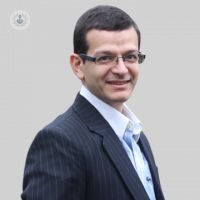How is gallbladder surgery performed?
Written by:In this article below, Professor Lee Dvorkin, a highly distinguished consultant colorectal and general surgeon, explains when gallbladder surgery is typically performed, and outlines the potential risks and complications.

How is gallbladder surgery performed?
In 98 per cent of cases, the gallbladder can be removed with keyhole surgery leaving three or four tiny skin cuts on the abdomen. This is called a laparoscopic cholecystectomy. Through these small cuts, a camera is inserted so the surgeons can see inside the abdomen on a monitor.
Operating instruments are inserted into the other cuts and are used to remove the gallbladder. The gallbladder must be disconnected from the liver and bile ducts (tubes containing bile) before it can be removed. Patients often go home the same day and recover after two weeks.
In some cases, a larger skin cut is needed (open surgery), with patients staying in hospital for three to four days and taking six to eight weeks to fully recover. Both techniques require a general anaesthetic and should be undertaken by surgeons with experience in this type of surgery.
When is it required?
Gallbladder surgery is most often recommended for gallstones. Gallstones are very common, but only need treatment if they start causing symptoms such as abdominal pain (usually in the right upper abdomen with radiation to the back), cholecystitis (an infection of the gallbladder needing antibiotics) or pancreatitis (inflammation of the pancreas caused by gallstones. It causes abdominal pain and can be serious in some people).
Surgery is occasionally needed when a polyp grows in the gallbladder or if a patient is diagnosed with gallbladder cancer.
Is there anyone who may not be suitable for gallbladder surgery?
Patients must be fit enough to undergo a general anaesthetic and surgery. Before having the operation, all patients will be pre-assessed by a specialist nurse to make sure they are strong enough for the operation. For some patients who are not suitable for gallbladder surgery, there may be other options to resolve their problems, and this should be discussed with a surgeon.
What are the associated risks?
All operations have risks and this includes gallbladder surgery. Common risks include wound infection and wound pain. Rare complications (one per cent chance) include serious bleeding or a leak of bile from the bile duct.
Very rarely, the bile duct can be damaged or there can be injury to other organs in the body like the bowel. Thankfully, serious heart and lung complications, as well as complications from general anaesthetics, are very rare.
What is recovery from gallbladder surgery like?
This depends on whether the operation was keyhole or open surgery. Recovery will be slower after open surgery. Once recovered, most patients have no long-term side-effects.
In the short-term, patients will have the usual post-operative pain and bruising around the wounds. Some patients get loose stools and acid indigestion for a few weeks, but this usually resolves on its own. If symptoms persist or get worse, patients should seek medical advice.
If you wish to consult with Professor Lee Dvorkin today, head over to his Top Doctors profile.


